
THEORY AND DECISION
Scope & Guideline
Catalyzing Interdisciplinary Research to Drive Effective Decision-Making
Introduction
Aims and Scopes
- Decision Theory and Economic Behavior:
The journal's core area lies in decision theory, particularly how individuals and organizations make choices under conditions of uncertainty and risk. It encompasses various economic behaviors and their implications for market dynamics. - Game Theory and Strategic Interaction:
A significant focus is on game theory, analyzing strategic interactions among rational agents. This includes studies on auctions, bargaining, and cooperative games, providing insights into competitive behaviors and outcomes. - Behavioral Insights into Decision-Making:
THEORY AND DECISION also delves into behavioral economics, examining how psychological factors influence economic decisions. This includes exploring biases, heuristics, and social preferences that affect individual choices. - Mathematical and Computational Models:
The journal emphasizes rigorous mathematical modeling and computational approaches to understand decision-making processes. This includes developing new models and methodologies for analyzing complex decision scenarios. - Interdisciplinary Approaches:
The journal promotes interdisciplinary research, integrating insights from psychology, sociology, and cognitive science into decision theory. This broadens the scope of analysis and enhances the relevance of findings across different fields.
Trending and Emerging
- Incorporation of Behavioral Economics:
There is a growing trend towards integrating behavioral economics into decision theory. This includes exploring how cognitive biases and social influences affect decision-making processes, leading to a more nuanced understanding of economic behavior. - Complex Decision Environments:
Research increasingly addresses decision-making in complex environments, such as multi-dimensional contests and strategic interactions with uncertainty. This trend reflects a recognition of the intricate dynamics that characterize real-world decision scenarios. - Focus on Social Preferences and Fairness:
Recent studies show an increasing emphasis on social preferences, fairness, and justice in decision-making. This shift highlights the importance of ethical considerations and social impacts in economic and strategic interactions. - Dynamic and Contextual Decision Models:
The development of dynamic decision models that account for changing contexts and temporal factors is gaining momentum. Researchers are exploring how decisions evolve over time and the implications of these dynamics for economic outcomes. - Interdisciplinary Research Approaches:
There is a notable trend towards interdisciplinary research that combines insights from various fields, including psychology, sociology, and economics. This approach enriches the analysis of decision-making processes and broadens the applicability of findings.
Declining or Waning
- Traditional Utility Theory:
There seems to be a decreasing focus on classical utility theory, particularly the axiomatic foundations that have dominated earlier research. As newer models and behavioral insights gain traction, traditional approaches are less frequently explored. - Static Decision Models:
Research employing static models of decision-making is becoming less common. The trend is shifting towards dynamic and contextual models that better reflect real-world complexities and temporal factors in decision processes. - Overemphasis on Individual Rationality:
There is a noticeable decline in studies solely focused on individual rationality. The field is increasingly recognizing the importance of social and contextual influences, leading to a broader exploration of collective decision-making. - Narrow Applications of Game Theory:
While game theory remains a key focus, there is a waning interest in its more traditional applications, such as simple two-player games. Researchers are now more inclined to investigate complex, multi-agent scenarios that better capture real-world interactions. - Limited Experimental Investigations:
The number of experimental studies focusing solely on traditional decision-making paradigms appears to be decreasing. Instead, there is a shift towards more innovative experimental designs that incorporate social dynamics and behavioral aspects.
Similar Journals

ACM SIGecom Exchanges
Fostering Innovation at the Intersection of Theory and PracticeACM SIGecom Exchanges is a leading journal within the field of economics and computation, published by the Association for Computing Machinery (ACM). This esteemed publication serves as a valuable resource for researchers, professionals, and students alike, focusing on the intersection of economic theory and computational methods. Aiming to foster dialogue and collaboration in this increasingly important arena, ACM SIGecom Exchanges provides an open forum for innovative research, theoretical advancements, and practical applications. While specific metrics such as impact factors and HIndex may not be available at this time, the journal's commitment to quality and influence in the field is unquestionable. The journal is accessible for contributors and readers, ensuring that cutting-edge findings and insightful discussions are readily available within the academic community. Join the conversation and explore the evolving landscape of economics and computation through ACM SIGecom Exchanges, where knowledge meets innovation.
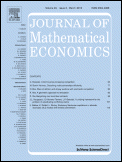
JOURNAL OF MATHEMATICAL ECONOMICS
Advancing Economic Thought with Rigorous Mathematical Analysis.JOURNAL OF MATHEMATICAL ECONOMICS, published by Elsevier Science SA, is a premier journal that bridges the gap between mathematics and economics, making significant contributions to both fields since its inception in 1974. This journal is dedicated to publishing high-quality research that applies mathematical methods to solve complex economic problems, thus nurturing an interdisciplinary dialogue essential for advancing both theoretical and practical applications in economics. With an impact factor that reflects its esteemed position (Q2 in Applied Mathematics and Economics and Econometrics as of 2023), the journal ranks prominently within its categories, promoting rigorous analysis and innovative methodologies. The Journal of Mathematical Economics invites contributions from researchers, professionals, and students alike, providing a platform for the dissemination of cutting-edge research that shapes economic thought and policy. Operating without open access, it remains a crucial resource for anyone keen to delve deeper into the mathematical foundations of economic theory, while it continues to evolve and maintain relevance through 2024 and beyond.

Economic Theory Bulletin
Exploring the frontiers of economic thought and application.Welcome to the Economic Theory Bulletin, a premier journal dedicated to advancing the field of economic theory. Published by SPRINGER HEIDELBERG, this journal serves as a critical platform for researchers and professionals to disseminate innovative ideas and research findings that shape economic discourse. With an ISSN of 2196-1085 and an E-ISSN of 2196-1093, the Economic Theory Bulletin invites contributions that address theoretical advancements and empirical applications in economics, fostering insightful dialogue among scholars. Although the journal operates under a traditional access model, it remains committed to high-quality, peer-reviewed scholarship that meets the rigorous standards of the academic community. The diverse range of articles published here not only contributes to the theoretical foundations of economics but also emphasizes real-world applications, making it an essential resource for students and professionals alike. The journal’s impact on the evolving landscape of economic theory ensures that it remains a vital reference point for the latest research and trends in the field.
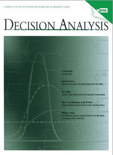
Decision Analysis
Exploring New Frontiers in Decision Analysis.Decision Analysis, published by INFORMS, is a premier journal dedicated to advancing the field of decision sciences through rigorous quantitative analysis and innovative methodologies. With an ISSN of 1545-8490 and E-ISSN 1545-8504, the journal operates from the United States and has established itself within the academic community, achieving a Q2 ranking in the Decision Sciences category as of 2023. Spanning years from 2010 to 2024, the journal provides a forum for researchers, professionals, and students to disseminate and engage with significant contributions that enhance decision-making processes across various domains. Although currently not offering open access, the journal maintains a valuable platform for scholarly exchange, ensuring that critical insights into decision analysis are both accessible and impactful. As it continues to shape the landscape of decision sciences, Decision Analysis invites submissions that push the boundaries of current knowledge and application in this dynamic field.

JOURNAL OF INSTITUTIONAL AND THEORETICAL ECONOMICS-ZEITSCHRIFT FUR DIE GESAMTE STAATSWISSENSCHAFT
Pioneering research for a deeper understanding of economic frameworks.JOURNAL OF INSTITUTIONAL AND THEORETICAL ECONOMICS-ZEITSCHRIFT FUR DIE GESAMTE STAATSWISSENSCHAFT is a distinguished publication dedicated to advancing the fields of institutional and theoretical economics. Published by J C B MOHR in Germany, this journal serves as a critical platform for scholarly discourse and research dissemination, encouraging contributions that delve into economic theory and its practical implications in institutional contexts. With an ISSN of 0932-4569 and an E-ISSN of 1614-0559, it enjoys a respectable position, having achieved a Q3 ranking in Economics and Econometrics according to the 2023 categorization. This journal, which bridges theoretical frameworks with real-world applications, is vital for researchers, practitioners, and students seeking to deepen their understanding of economic systems and institutions. Although not an open-access journal, it provides insights valuable for both academia and policy-making. Operating since 1992, with a commitment to rigorous peer-reviewed scholarship, the JOURNAL OF INSTITUTIONAL AND THEORETICAL ECONOMICS remains a pivotal resource in the evolving landscape of economic research.
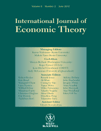
International Journal of Economic Theory
Advancing economic thought for a global audience.International Journal of Economic Theory, published by Wiley, serves as a vital platform for scholars and researchers in the fields of economics and econometrics. With its ISSN 1742-7355 and E-ISSN 1742-7363, this journal focuses on advancing theoretical understandings in economics, providing a comprehensive analysis of contemporary economic issues. The journal has been converging knowledge and innovation since its inception in 2009 and continues to sustain a commitment to high-quality research until 2024. As a Q3 journal in the 2023 category rankings, it ranks in the 21st percentile in Scopus for Economics and Econometrics, reflecting its established presence amidst competitive scholarly discourse. Although it is not open access, the journal is widely accessible through institutional subscriptions, facilitating learning and research for professionals, graduate students, and academic leaders. The International Journal of Economic Theory is pivotal for those looking to contribute to economic thought, ensuring that emerging theories find a respected outlet in the global academic landscape.

KYBERNETIKA
Fostering Academic Excellence in Cutting-Edge Disciplines.KYBERNETIKA is a distinguished journal published by KYBERNETIKA in the Czech Republic, dedicated to advancing the fields of Artificial Intelligence, Control and Systems Engineering, Electrical and Electronic Engineering, Information Systems, Software, and Theoretical Computer Science. Since its inception in 1972, it has played a pivotal role in disseminating research findings and innovative theories, providing a platform for academic discourse and groundbreaking studies. The journal has evolved through various periods, including converged years from 1972 to 1989 and 1996 to 2024, showcasing a commitment to ongoing scholarship within the vibrant academic community. Its current standing in multiple categories reflects its importance, being ranked in the third and fourth quartiles in various disciplines, thus appealing to diverse researchers and professionals. While KYBERNETIKA does not offer Open Access, it remains a valuable resource for those interested in the latest developments in its respective fields. The address for submissions and inquiries is POD VODARENSKOU VEZI 4, PRAGUE 8 182 08, CZECH REPUBLIC. Engage with this invaluable repository of knowledge to stay at the forefront of research and innovation.
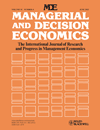
MANAGERIAL AND DECISION ECONOMICS
Exploring the Intersection of Economics and Management ExcellenceMANAGERIAL AND DECISION ECONOMICS is a highly regarded academic journal published by John Wiley & Sons Ltd that serves as a vital resource in the field of business and management. With an ISSN of 0143-6570 and an E-ISSN of 1099-1468, this journal has established itself as a prominent platform for disseminating cutting-edge research from its inception in 1980 through to 2024. Currently ranked in the Q2 category across multiple fields—including Business and International Management, Management of Technology and Innovation, Management Science and Operations Research, and Strategy and Management—it highlights significant contributions within these domains. The journal is based in the United Kingdom and contributes to the ongoing dialogue and development of innovative managerial practices driven by empirical decision-making research. Although the journal does not offer open access, it remains highly influential, with noteworthy Scopus rankings showing its strong impact within the scholarly community. Researchers, professionals, and students alike will find valuable insights and advancements in management science that inform and enrich their practices and academic pursuits.

Decisions in Economics and Finance
Advancing the Frontiers of Economic ThoughtDecisions in Economics and Finance, published by SPRINGER INT PUBL AG, is a leading journal in the fields of economics, econometrics, and finance, providing a critical platform for researchers, professionals, and students to disseminate their findings and insights. With an impressive impact factor positioned in the Q2 category for both Economics and Finance in 2023, this journal is recognized for its rigorous peer-reviewed process and impactful research contributions. The journal spans over areas of general economics and finance, emphasized by its Scopus rankings, which place it in the 68th and 50th percentiles respectively. Since its inception in 1997 and continuing through its conferred years, Decisions in Economics and Finance continues to foster innovative approaches to economic and financial decision-making while bridging theoretical and practical applications. While it currently does not offer Open Access options, its commitment to quality research and interdisciplinary collaboration makes it a vital resource for anyone engaged in these dynamic fields.
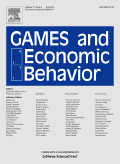
GAMES AND ECONOMIC BEHAVIOR
Illuminating the Pathways of Economic Decision-MakingGAMES AND ECONOMIC BEHAVIOR, published by Academic Press Inc Elsevier Science, is a premier journal in the fields of economics and finance, with an impact factor that strongly reflects its esteemed position in academia. Established in 1989 and converging through to 2024, this journal delves into the intricate relationships between strategic interactions and economic behavior, making it a pivotal resource for researchers, professionals, and students alike. As a Q1 journal in both Economics and Econometrics and Finance, it maintains rigorous standards that attract high-quality research and theoretical advancements. Although it currently does not offer open access options, the journal's wealth of articles and findings continues to contribute significantly to the discourse surrounding economic strategies, decision-making processes, and market behavior. For those seeking to deepen their understanding of the economic implications of games and their behavioral aspects, GAMES AND ECONOMIC BEHAVIOR remains an essential academic resource.